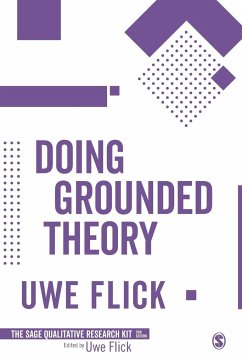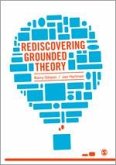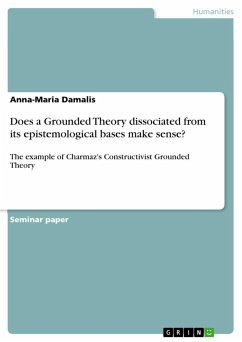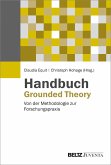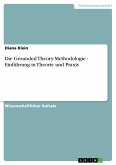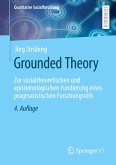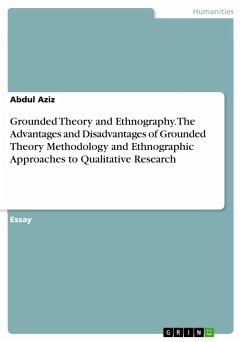Uwe Flick
Doing Grounded Theory
Uwe Flick
Doing Grounded Theory
- Broschiertes Buch
- Merkliste
- Auf die Merkliste
- Bewerten Bewerten
- Teilen
- Produkt teilen
- Produkterinnerung
- Produkterinnerung
This short, easy to read introduction to grounded theory covers each stage of the process from formulating a research question to coding and forming theories from data, helping the reader to employ the method in their research project.
Andere Kunden interessierten sich auch für
![Rediscovering Grounded Theory Rediscovering Grounded Theory]() Barry GibsonRediscovering Grounded Theory208,99 €
Barry GibsonRediscovering Grounded Theory208,99 €![Does a Grounded Theory dissociated from its epistemological bases make sense? Does a Grounded Theory dissociated from its epistemological bases make sense?]() Anna-Maria DamalisDoes a Grounded Theory dissociated from its epistemological bases make sense?16,95 €
Anna-Maria DamalisDoes a Grounded Theory dissociated from its epistemological bases make sense?16,95 €![Handbuch Grounded Theory Handbuch Grounded Theory]() Handbuch Grounded Theory49,95 €
Handbuch Grounded Theory49,95 €![Die Grounded Theory-Methodologie - Einführung in Theorie und Praxis Die Grounded Theory-Methodologie - Einführung in Theorie und Praxis]() Diana KleinDie Grounded Theory-Methodologie - Einführung in Theorie und Praxis15,95 €
Diana KleinDie Grounded Theory-Methodologie - Einführung in Theorie und Praxis15,95 €![Grounded Theory Grounded Theory]() Jörg StrübingGrounded Theory19,99 €
Jörg StrübingGrounded Theory19,99 €![Geflüchtete Menschen auf dem deutschen Arbeitsmarkt. Eine qualitative Interviewstudie auf der Grundlage der Grounded-Theory Geflüchtete Menschen auf dem deutschen Arbeitsmarkt. Eine qualitative Interviewstudie auf der Grundlage der Grounded-Theory]() Helen BroxGeflüchtete Menschen auf dem deutschen Arbeitsmarkt. Eine qualitative Interviewstudie auf der Grundlage der Grounded-Theory47,95 €
Helen BroxGeflüchtete Menschen auf dem deutschen Arbeitsmarkt. Eine qualitative Interviewstudie auf der Grundlage der Grounded-Theory47,95 €![Grounded Theory and Ethnography. The Advantages and Disadvantages of Grounded Theory Methodology and Ethnographic Approaches to Qualitative Research Grounded Theory and Ethnography. The Advantages and Disadvantages of Grounded Theory Methodology and Ethnographic Approaches to Qualitative Research]() Abdul AzizGrounded Theory and Ethnography. The Advantages and Disadvantages of Grounded Theory Methodology and Ethnographic Approaches to Qualitative Research15,95 €
Abdul AzizGrounded Theory and Ethnography. The Advantages and Disadvantages of Grounded Theory Methodology and Ethnographic Approaches to Qualitative Research15,95 €-
-
-
This short, easy to read introduction to grounded theory covers each stage of the process from formulating a research question to coding and forming theories from data, helping the reader to employ the method in their research project.
Produktdetails
- Produktdetails
- The Sage Qualitative Research Kit
- Verlag: Sage Publications
- 2nd ed.
- Seitenzahl: 178
- Erscheinungstermin: 29. September 2018
- Englisch
- Abmessung: 234mm x 156mm x 10mm
- Gewicht: 276g
- ISBN-13: 9781473912007
- ISBN-10: 1473912008
- Artikelnr.: 48765443
- Herstellerkennzeichnung
- Libri GmbH
- Europaallee 1
- 36244 Bad Hersfeld
- gpsr@libri.de
- The Sage Qualitative Research Kit
- Verlag: Sage Publications
- 2nd ed.
- Seitenzahl: 178
- Erscheinungstermin: 29. September 2018
- Englisch
- Abmessung: 234mm x 156mm x 10mm
- Gewicht: 276g
- ISBN-13: 9781473912007
- ISBN-10: 1473912008
- Artikelnr.: 48765443
- Herstellerkennzeichnung
- Libri GmbH
- Europaallee 1
- 36244 Bad Hersfeld
- gpsr@libri.de
Uwe Flick is Senior Professor of Qualitative Research in Social Science and Education at the Freie Universität Berlin, Germany. He is a trained psychologist and sociologist and received his PhD from the Freie Universität Berlin in 1988 and his Habilitation from the Technical University Berlin in 1994. He has been Professor of Qualitative Research at Alice Salomon University of Applied Sciences in Berlin, Germany and at the University of Vienna, Austria. Previously, he was Adjunct Professor at the Memorial University of Newfoundland in St. John's, Canada; a Lecturer in research methodology at the Freie Universität Berlin; a Reader and Assistant Professor in qualitative methods and evaluation at the Technical University Berlin; and Associate Professor and Head of the Department of Medical Sociology at the Hannover Medical School. He has held visiting appointments at the London School of Economics, the Ecole des Hautes Etudes en Sciences Sociales in Paris, Cambridge University (UK), Memorial University of St John's (Canada), University of Lisbon (Portugal), Institute of Higher Studies in Vienna, in Italy and Sweden, and the School of Psychology at Massey University, Auckland (New Zealand). His main research interests are qualitative methods, social representations in the fields of individual and public health, vulnerability in fields like youth homelessness or (forced) migration and chronical illness in everyday live. He is the editor of The SAGE Handbook of Qualitative Research Design (2 Vols.; Sage 2022). The SAGE Handbook of Qualitative Data Analysis (Sage, 2014), The SAGE Qualitative Research Kit (Sage, 2nd edn, 2018), A Companion to Qualitative Research (Sage, 2004), Psychology of the Social (Cambridge University Press, 1998). His most recent publications are the seventh edition of An Introduction to Qualitative Research (Sage, 2023), Doing Grounded Theory (Sage, 2018), Doing Triangulation and Mixed Methods (Sage, 2018), The SAGE Handbook of Qualitative Data Collection (editor, Sage, 2018), the third edition of Introducing Research Methodology - Thinking Your Way through Your Research Project (Sage, 2020) and Doing Interview Research - The Essential How To Guide (Sage 2022). In 2019, Uwe Flick received the Lifetime Award in Qualitative Inquiry at the 15th International Congress of Qualitative Inquiry.
1. Background: Approaches and philosophies of grounded theory
2. Doing grounded theory: Key components, process, and elements
3. Getting in: Data collection in grounded theory
4. Grounded theory coding: Ways and versions
5. Going ahead: Recent developments in data analysis
6. Going beyond: Theoretical sampling, sorting, and saturation
7. Output: Writing and quality in grounded theory
8. Advancing: Research design in grounded theory
9. Becoming systematic: Triangulation in grounded theory
10. Rounding Up: Doing perspectivist grounded theory
2. Doing grounded theory: Key components, process, and elements
3. Getting in: Data collection in grounded theory
4. Grounded theory coding: Ways and versions
5. Going ahead: Recent developments in data analysis
6. Going beyond: Theoretical sampling, sorting, and saturation
7. Output: Writing and quality in grounded theory
8. Advancing: Research design in grounded theory
9. Becoming systematic: Triangulation in grounded theory
10. Rounding Up: Doing perspectivist grounded theory
1. Background: Approaches and philosophies of grounded theory
2. Doing grounded theory: Key components, process, and elements
3. Getting in: Data collection in grounded theory
4. Grounded theory coding: Ways and versions
5. Going ahead: Recent developments in data analysis
6. Going beyond: Theoretical sampling, sorting, and saturation
7. Output: Writing and quality in grounded theory
8. Advancing: Research design in grounded theory
9. Becoming systematic: Triangulation in grounded theory
10. Rounding Up: Doing perspectivist grounded theory
2. Doing grounded theory: Key components, process, and elements
3. Getting in: Data collection in grounded theory
4. Grounded theory coding: Ways and versions
5. Going ahead: Recent developments in data analysis
6. Going beyond: Theoretical sampling, sorting, and saturation
7. Output: Writing and quality in grounded theory
8. Advancing: Research design in grounded theory
9. Becoming systematic: Triangulation in grounded theory
10. Rounding Up: Doing perspectivist grounded theory

